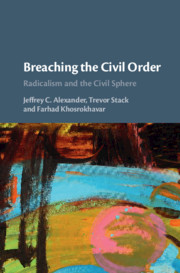Book contents
- Breaching the Civil Order
- Breaching the Civil Order
- Copyright page
- Epigraph
- Contents
- Figures
- Contributors
- Preface
- Introduction
- 1 Wedging Open Established Civil Spheres
- 2 Radical Protest on a University Campus
- 3 Antiracism Movements and the US Civil Sphere
- 4 The Civil Sphere and Its Variants in Light of the Arab Revolutions and Jihadism in Europe
- 5 Restaging a Vital Center within Radicalized Civil Societies
- 6 Anti-immigrant Movements and the Self-Poisoning of the Civil Sphere
- 7 The Civil Sphere and Revolutionary Violence
- 8 “We All Came Together That Day”
- 9 Disobedience in Civil Regeneration
- Commentary
- Conclusion
- Index
- References
Conclusion
Reflections on Radicalism and the Civil Sphere
Published online by Cambridge University Press: 25 November 2019
- Breaching the Civil Order
- Breaching the Civil Order
- Copyright page
- Epigraph
- Contents
- Figures
- Contributors
- Preface
- Introduction
- 1 Wedging Open Established Civil Spheres
- 2 Radical Protest on a University Campus
- 3 Antiracism Movements and the US Civil Sphere
- 4 The Civil Sphere and Its Variants in Light of the Arab Revolutions and Jihadism in Europe
- 5 Restaging a Vital Center within Radicalized Civil Societies
- 6 Anti-immigrant Movements and the Self-Poisoning of the Civil Sphere
- 7 The Civil Sphere and Revolutionary Violence
- 8 “We All Came Together That Day”
- 9 Disobedience in Civil Regeneration
- Commentary
- Conclusion
- Index
- References
Summary
The development of a civil sphere implies the existence of a specific form of solidarity, broader than those created by physical co-presence, emotional attachment, repeated interaction, resource exchange, and political or religious homophily. Such a solidary sphere, sustained by a distinctive set of symbolic codes and embedded in specialized institutions, is a key element in the working of any complex, modern society and is a requisite for democratic governance in pluralist societies (Alexander 2006:38). It is, however, far from being the overarching, or even dominant, form of social organization. On the contrary, it is constantly encroached by the functional imperatives of other social spheres. It is often torn apart by the diverse (more particularistic) logics that other spheres nurture and advance. In any of its actually existing forms, moreover, the civil sphere is also highly fragmented and imperfect. Conceived, in principle, as an imagined community of equals, its actual practices are always defined by the particularistic understanding of its most established core groups.
- Type
- Chapter
- Information
- Breaching the Civil OrderRadicalism and the Civil Sphere, pp. 268 - 284Publisher: Cambridge University PressPrint publication year: 2019
References
- 3
- Cited by



